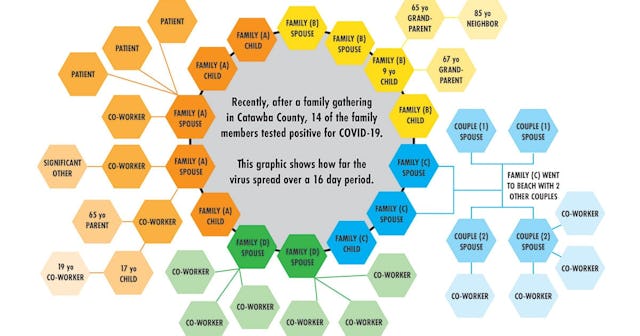Family Gathering Infects 41 People With Coronavirus

This is exactly why officials want to limit the size of gatherings to help slow the spread of the coronavirus
In case anyone doesn’t know this, we’re still very much in a pandemic, and it’s getting much, much worse. Cases of the coronavirus are climbing in almost all U.S. states. So are deaths. If we continue to eschew masks and social distancing guidelines, things are only going to continue to get worse. Take North Carolina, for example, where a family gathering where no one wore a mask or practiced any sort of distancing set off a chain reaction that has infected at least 41 people — so far.
Officials say more than two dozen family members attended the party, which was in Catawba County, about 45 minutes northwest of Charlotte. Around half of them ended up infected with the coronavirus.
“Folks did not wear masks or observe physical distancing at this gathering, and 14 people who attended subsequently tested positive for COVID-19,” said Jennifer McCracken, the county’s public health director.
But it gets worse. Family members who got infected at the party went about their daily lives afterward, some of them not showing symptoms for up to two weeks. With the coronavirus, it’s typical for symptoms to appear between two days and two weeks after exposure.
“This set into motion a person-to-person contact chain that to date has spread COVID-19 to 41 people in 9 different families and 8 different workplaces,” McCracken said.
Catawba County
According to the county’s contact tracing map, two infected people from the party returned to work. They infected a total of nine of their coworkers, who then spread the coronavirus to their parents, spouses, and kids. A child who was at the original party spread the illness to a neighbor and two grandparents. A couple who attended the party went on a beach trip with two other couples. Both of those couples were then infected, and one of them passed the virus to at least four of their coworkers.
According to McCracken, all of this could easily have been prevented — all anyone needed to do was put on masks and stay six feet apart at that original party.
“It’s not hard to prevent the spread COVID-19,” she said. “What’s hard is having to call 20, 30, 40 people a day and tell them that not only are they sick with an untreatable illness, but they are also required to isolate themselves from others, including their loved ones, and stay home from work for two weeks or until they recover.”
McCracken also noted that our country isn’t exactly well-equipped for some people when it comes to taking an extended absence from their jobs or having someone to help take care of them or their families. “This is especially difficult when they do not have the support systems that many of us take for granted, such as paid sick leave, the ability to isolate in their own home, or available caretakers for their children,” she said. “It’s even harder when they are experiencing severe illness as a result of their exposure – exposure that could have been prevented.”
This article was originally published on